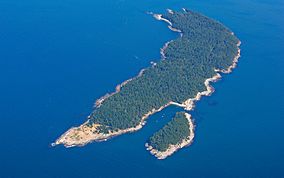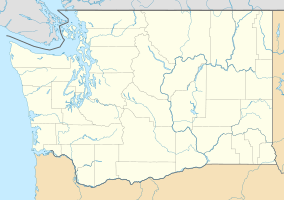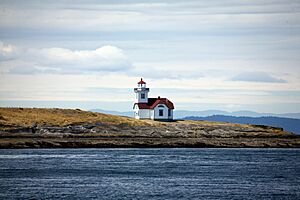Patos Island facts for kids
Quick facts for kids Patos Island Marine State Park |
|
|---|---|

Aerial view of Patos Island
|
|
| Location | San Juan County, Washington, United States |
| Area | 207 acres (84 ha) |
| Elevation | 102 ft (31 m) |
| Designation | Washington marine state park |
| Established | 1974 |
| Administrator | Bureau of Land Management, Washington State Parks and Recreation Commission |
| Website | Patos Island Marine State Park |
Patos Island is a small, beautiful island. It is located in the San Juan Islands in Washington, USA. Since 1893, a special lighthouse has stood on the island. This lighthouse helps guide ships safely. It shows them the way through Boundary Pass. This pass is a waterway between Canada and the United States.
Contents
What's in a Name?
The name Patos comes from a Spanish word. Pato means "duck." Spanish explorers gave the island this name in 1792. Commander Dionisio Alcalá Galiano and Captain Cayetano Valdés y Flores were sailing nearby. They were on their ships, the Sutil and the Mexicana. They saw many ducks, so they named the island "Duck Island."
Patos Island State Park
Patos Island and the small islands next to it make up Patos Island State Park. This is a marine park, which means it's mostly about the water. The park covers about 207-acre (0.84 km2) of land. It also has 20,000 feet (6,100 m) of saltwater shoreline.
The Washington State Parks and Recreation Commission started managing Patos Island as a state park in 1974. They work with the Bureau of Land Management. The entire island is owned by the United States government.
Exploring the Park
Visitors can enjoy many things at Patos Island State Park.
- There is a small campground at Active Cove. This is on the west side of the island.
- You can walk along a 1.5-mile (2.4 km) loop trail. It's a great way to see the island.
- There are two special buoys offshore. These are for boats to tie up to safely.
Part of a National Monument
The whole island, including its historic lighthouse, is very important. In 2013, it became part of the San Juan Islands National Monument. This means it is a protected area. It helps keep the island's natural beauty and history safe for everyone.
See also
 In Spanish: Isla de Patos (Estados Unidos) para niños
In Spanish: Isla de Patos (Estados Unidos) para niños
 | Bessie Coleman |
 | Spann Watson |
 | Jill E. Brown |
 | Sherman W. White |



